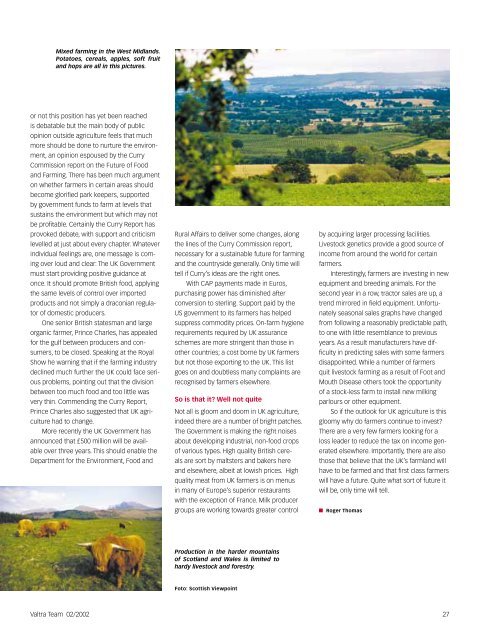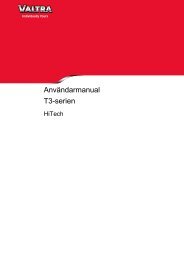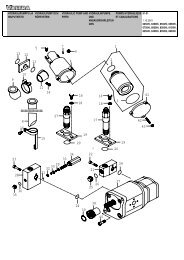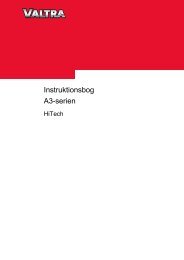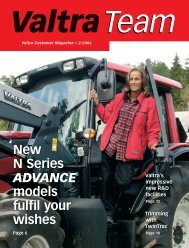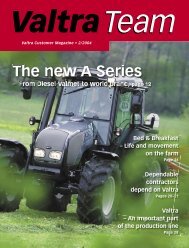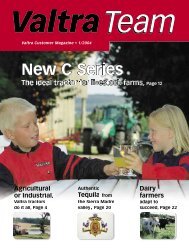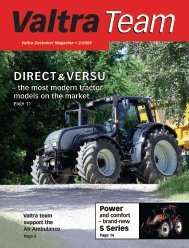New T series - Valtra
New T series - Valtra
New T series - Valtra
- TAGS
- valtra
- www.valtra.com
Create successful ePaper yourself
Turn your PDF publications into a flip-book with our unique Google optimized e-Paper software.
Mixed farming in the West Midlands.<br />
Potatoes, cereals, apples, soft fruit<br />
and hops are all in this pictures.<br />
or not this position has yet been reached<br />
is debatable but the main body of public<br />
opinion outside agriculture feels that much<br />
more should be done to nurture the environment,<br />
an opinion espoused by the Curry<br />
Commission report on the Future of Food<br />
and Farming. There has been much argument<br />
on whether farmers in certain areas should<br />
become glorifi ed park keepers, supported<br />
by government funds to farm at levels that<br />
sustains the environment but which may not<br />
be profi table. Certainly the Curry Report has<br />
provoked debate, with support and criticism<br />
levelled at just about every chapter. Whatever<br />
individual feelings are, one message is coming<br />
over loud and clear: The UK Government<br />
must start providing positive guidance at<br />
once. It should promote British food, applying<br />
the same levels of control over imported<br />
products and not simply a draconian regulator<br />
of domestic producers.<br />
One senior British statesman and large<br />
organic farmer, Prince Charles, has appealed<br />
for the gulf between producers and consumers,<br />
to be closed. Speaking at the Royal<br />
Show he warning that if the farming industry<br />
declined much further the UK could face serious<br />
problems, pointing out that the division<br />
between too much food and too little was<br />
very thin. Commending the Curry Report,<br />
Prince Charles also suggested that UK agriculture<br />
had to change.<br />
More recently the UK Government has<br />
announced that £500 million will be available<br />
over three years. This should enable the<br />
Department for the Environment, Food and<br />
Rural Affairs to deliver some changes, along<br />
the lines of the Curry Commission report,<br />
necessary for a sustainable future for farming<br />
and the countryside generally. Only time will<br />
tell if Curry’s ideas are the right ones.<br />
With CAP payments made in Euros,<br />
purchasing power has diminished after<br />
conversion to sterling. Support paid by the<br />
US government to its farmers has helped<br />
suppress commodity prices. On-farm hygiene<br />
requirements required by UK assurance<br />
schemes are more stringent than those in<br />
other countries; a cost borne by UK farmers<br />
but not those exporting to the UK. This list<br />
goes on and doubtless many complaints are<br />
recognised by farmers elsewhere.<br />
So is that it? Well not quite<br />
Not all is gloom and doom in UK agriculture,<br />
indeed there are a number of bright patches.<br />
The Government is making the right noises<br />
about developing industrial, non-food crops<br />
of various types. High quality British cereals<br />
are sort by maltsters and bakers here<br />
and elsewhere, albeit at lowish prices. High<br />
quality meat from UK farmers is on menus<br />
in many of Europe’s superior restaurants<br />
with the exception of France. Milk producer<br />
groups are working towards greater control<br />
Production in the harder mountains<br />
of Scotland and Wales is limited to<br />
hardy livestock and forestry.<br />
Foto: Scottish Viewpoint<br />
by acquiring larger processing facilities.<br />
Livestock genetics provide a good source of<br />
income from around the world for certain<br />
farmers.<br />
Interestingly, farmers are investing in new<br />
equipment and breeding animals. For the<br />
second year in a row, tractor sales are up, a<br />
trend mirrored in fi eld equipment. Unfortunately<br />
seasonal sales graphs have changed<br />
from following a reasonably predictable path,<br />
to one with little resemblance to previous<br />
years. As a result manufacturers have diffi<br />
culty in predicting sales with some farmers<br />
disappointed. While a number of farmers<br />
quit livestock farming as a result of Foot and<br />
Mouth Disease others took the opportunity<br />
of a stock-less farm to install new milking<br />
parlours or other equipment.<br />
So if the outlook for UK agriculture is this<br />
gloomy why do farmers continue to invest?<br />
There are a very few farmers looking for a<br />
loss leader to reduce the tax on income generated<br />
elsewhere. Importantly, there are also<br />
those that believe that the UK’s farmland will<br />
have to be farmed and that fi rst class farmers<br />
will have a future. Quite what sort of future it<br />
will be, only time will tell.<br />
Roger Thomas<br />
<strong>Valtra</strong> Team 02/2002 27


